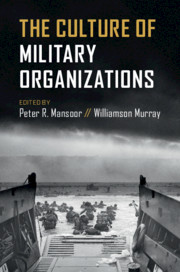Book contents
- The Culture of Military Organizations
- The Culture of Military Organizations
- Copyright page
- Dedication
- Contents
- Contributors
- Introduction
- Part I Theoretical Frameworks
- Part II Land Forces
- 3 Ulysses S. Grant and the Culture of the Union Army of the Tennessee
- 4 “Playing a Very Bold Game”
- 5 German Army Culture, 1871–1945
- 6 The Culture of the Indian Army, 1900–1947
- 7 An Army Apart
- 8 The Culture of the British Army, 1914–1945
- 9 Imperial Japanese Army Culture, 1918–1945
- 10 Military Culture, Military Efficiency, and the Red Army, 1917–1945
- 11 An Army Like No Other
- 12 The Weight of the Shadow of the Past
- 13 US Army Culture, 1973–2017
- Part III Maritime Forces
- Part IV Air Forces
- Conclusion
- Index
7 - An Army Apart
The Influence of Culture on the Victorian British Army
from Part II - Land Forces
Published online by Cambridge University Press: 05 October 2019
- The Culture of Military Organizations
- The Culture of Military Organizations
- Copyright page
- Dedication
- Contents
- Contributors
- Introduction
- Part I Theoretical Frameworks
- Part II Land Forces
- 3 Ulysses S. Grant and the Culture of the Union Army of the Tennessee
- 4 “Playing a Very Bold Game”
- 5 German Army Culture, 1871–1945
- 6 The Culture of the Indian Army, 1900–1947
- 7 An Army Apart
- 8 The Culture of the British Army, 1914–1945
- 9 Imperial Japanese Army Culture, 1918–1945
- 10 Military Culture, Military Efficiency, and the Red Army, 1917–1945
- 11 An Army Like No Other
- 12 The Weight of the Shadow of the Past
- 13 US Army Culture, 1973–2017
- Part III Maritime Forces
- Part IV Air Forces
- Conclusion
- Index
Summary
The remarkable effectiveness of the British army from Crimea to the Boer War reflected an institutional culture almost perfectly adapted to Victorian soldiers’ social origins, the tasks they were called upon to perform, and the colonial arenas in which they were asked to perform them, but also a culture increasingly out of step with its own society and evolving military technologies, methods, and challenges. Instead, fortified by the army’s success at its colonial tasks, and despite efforts by politicians and even some of the army’s own brightest intellectual lights, it survived – one might almost say defied – one institutional reform after another, until in South Africa in 1899, a string of calamitous defeats at the hands of what amounted to well-armed farmers upended both the army’s confidence and that of the British people in its professional competence. The institutional soul-searching that followed finally began transforming the British Army from what had become in many ways a military anachronism into a modern fighting force. That transformation came just in time to enable it to survive the bloody opening engagements of World War I and in the process help avert the rapid and decisive defeat of the Allied armies in France.
Keywords
- Type
- Chapter
- Information
- The Culture of Military Organizations , pp. 155 - 184Publisher: Cambridge University PressPrint publication year: 2019

